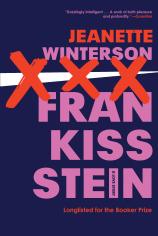Frankissstein: A Love Story
Review
Frankissstein: A Love Story
Jeanette Winterson’s latest novel, FRANKISSSTEIN --- which was longlisted for the 2019 Man Booker Prize --- is a postmodern delight, blending historical fiction with an exploration of artificial intelligence to examine questions about the body and the self, creation and destruction. It moves between Mary Shelley’s life in 19th-century Europe and a current landscape of AI, sexbots and contemporary grave robbing in the name of scientific progress. Shifting perspective, word play, pop music lyrics, LGBTQ issues and identity, Winterson throws so much at readers in this bold and challenging book that both retells Shelley’s story and the story for which she is best known.
In 1816, 19-year-old Mary Shelley is in Lake Geneva with her husband, poet Percy Shelley, her stepsister and their friends. Their vacation house is damp and dismal, and thoughts turn to horror and fiction. Shelley begins work on her masterpiece, FRANKENSTEIN, inspired not just by the setting but by her experiences with maternal loss --- the loss of both her mother and her child. Winterson’s Shelley contemplates love and grief, poetry and motherhood over the years as she sees two more children and then her husband die before her.
"...a postmodern delight, blending historical fiction with an exploration of artificial intelligence to examine questions about the body and the self, creation and destruction."
About 200 years later, a transgender doctor named Ry Shelley attends a Robotics Tec-X-Po in Nashville, Tennessee, pondering how robots will change the medical profession, mental health care and society as a whole. Dr. Shelley is in love with Victor Stein, for whom he procures body parts and with whom he debates AI. Stein sees Shelley as a “hybrid” and is fascinated by the possibilities he represents sexually, medically and philosophically. While Stein is enthusiastic about all of this, he is at least somewhat constrained. His colleague, sex-bot creator and entrepreneur Ron Lord, represents a technological future unrestrained by sexual morality and freed of complicated human relationships.
None of this is what Mary Shelley imagined when she cautioned about the responsibility of scientists and other creators, but Winterson takes her ideas where others have taken them before: to the dangerous prospect of science and invention run amok. Here those prospects, and their literary inspiration, are couched in a strange, compelling, philosophical and at times fractured vision.
By the end, Winterson’s cast has explored some important and tough questions from various points of view, sometimes with a dead seriousness and at other times with an over-the-top comic effect. Answers are not quite forthcoming, as Mary Shelley mourns for what is gone and Ry worries about what the future may hold.
It is not easy to describe the action of FRANKISSSTEIN, and really this is a novel of ideas more so than plot. From the dripping walls of the house in Switzerland to flooding tunnels leading to a secret lab, the characters move through dark spaces real and symbolic as they wrestle with their beliefs about science, literature, machines, love and more. The book is best when it inhabits Mary Shelley’s poetic world. It careens a bit wildly in the Ry Shelley sections, and is somewhat muddled at times in the last quarter of the story. This is a challenging work, in terms of both style and ideas. Winterson is clearly having fun, even if the themes here are quite serious.
Reviewed by Sarah Rachel Egelman on October 11, 2019




